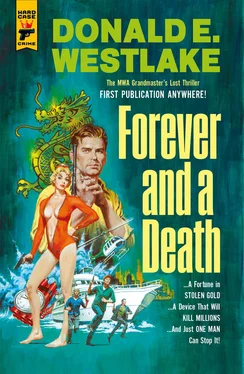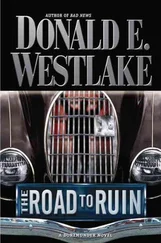“Yes it is, but—”
“I was on his ship for a while, ate some meals at the same table with him, heard him talk Chink with his crew, and that’s it. If you want to know why he did the chop on himself, you’ll have to ask somebody else.”
“I see,” Fairchild said. Firmly holding down his own irritation, he said, “Well, I appreciate your speaking with me, in any event.”
“Inspector, I’ll tell you the truth,” Manville said.
He was sounding more and more like a tough guy, less and less like an engineer. “I want to get along with Mr. Curtis these days,” he said, “and he asked me to call you, so here I am. But I don’t think he wants me to talk about me and him, so that’s what I’m not gonna do.”
“I understand completely,” Fairchild said. “Thank you, Mr. Manville. If I want to call you again...”
“I’m here,” Manville said. “Working hours.”
“Fine. Thank you.”
Fairchild replaced the receiver, and sat tapping his pen point against his memo pad, but wrote nothing down. Manville had not been exactly as anticipated, but on the other hand it was now easier for Fairchild to understand the battle of wills that had gone on last week between him and Curtis. He sounded like a man who could be quick to anger and quick to action. A diamond in the rough, it could be, a fellow from the wrong side of the tracks like Fairchild himself, got his education, became an engineer, highly thought of, but with the guttersnipe still there inside him, ready to be called upon.
And Manville supported Curtis, that was the important thing. So that should settle it; except that it didn’t, not quite. Something faintly buzzed at Fairchild’s attention, some fold in the fabric. Or it could be simply the possibility that Manville was lying now merely to cement his newly good relationship with Curtis.
But had Manville’s reaction to Kim Baldur’s name been a lie? Surely not. That had been real contempt in the man’s voice. Baldur’s description of Manville’s heroics against the thugs who’d boarded the Mallory certainly fit with the man Fairchild had just encountered, but that man wouldn’t be likely to save Kim Baldur from anything. Push her in harm’s way quicker than offer a helping hand.
Five minutes had passed, by the desk clock. Time to make sure no one was pulling a fast one. Fairchild buzzed for Sergeant Willkie, and when he appeared said, “Call that Singapore number, would you? And buzz me when it starts to ring.”
“Right, sir.”
Fairchild sat thinking, and the buzzer sounded, and he picked up to hear the phone ring, and then a female voice: “RC Structural.”
“Mr. Curtis, please.”
“Oh, I’m sorry, Mr. Curtis won’t be back until tomorrow.”
“Who’s second-in-command there at the moment?”
“Did you want Mr. Lowenthal?”
That was right, according to Fairchild’s information, that was one of Curtis’s vice-presidents. Fairchild said, “No, let me speak to Mr. Manville, please.”
“May I tell him who’s calling?”
“Inspector Fairchild.”
“One moment, please.”
It was in fact forty seconds by the clock, and here was Manville’s tough voice again: “That was quick.”
“It turned out I do have one more question,” Fairchild told him. “Sorry to interrupt your work.”
“Don’t worry about it. What’s the question?”
“During your time at Kanowit Island, did any other ships come by, make contact with Captain Zhang or anyone else on the crew?”
“Naw. We were alone out there until the very end, when those Planetwatch idiots showed up.”
“Well, thank you, Mr. Manville.”
“Any time.”
Fairchild hung up, satisfied. That was Manville, and he was in Singapore, and that was the office number of RC Structural.
There was nothing here. It was all smoke and mirrors. The public catfight between Curtis and Manville had got caught up in a young woman’s self-aggrandizing fantasies, and that was that. Captain Zhang had killed himself, for whatever reason, without a doubt. The two Planetwatch people had watched him unlock his door and enter his room. Very soon thereafter, he had leaped from the window. There was not the slightest sign that anyone else had been in the room. It was not murder, it was suicide, and the case was closed. If Zhang had been engaged in smuggling of some sort, the story would come out sooner or later. For now, there were other cases to think about. It had seemed briefly that Zhang’s death would lead to some more complex situation, but it had all dissolved into nothingness.
Fairchild tapped the buzzer on his desk, and when Sergeant Willkie’s head popped into view in the doorway he said, “Call that lawyer, Brevizin, thank him for making himself available, and tell him I won’t need to speak to him after all.”
“Right, sir.”
As a result of which, Inspector Fairchild did not get to hear Andre Brevizin describe the events involving Kim Baldur, both on the Mallory and here in Brisbane, that George Manville had last Friday related to him.
The corporate jet owned by RC Structural had cost sixty-five thousand dollars U.S. per month merely to exist, with its crew and its parking slot at Hong Kong International Airport, and the expenses went even higher whenever Curtis actually used it to go anywhere, so that was the one contraction he’d permitted himself when the money started to tighten and the mainland bastards were squeezing him like an orange. He’d moved his operations to Singapore, but did not move the plane to Changi Airport there, selling it instead — at a decent price, at least — to one of the Chinese businessmen growing sleek on the carcass of the city they’d just killed.
Which meant, these days, when Curtis had to undertake a long flight, he went commercial. But that was all right; he usually took Singapore Air, they knew him, and they treated him well. In fact, he wasn’t at all certain, after this current operation was finished and he was rich again, that he’d buy another jet for himself. That was, at his level, no longer a toy that impressed anybody.
Today’s flight was at five in the afternoon, it would take under four hours, and arrive in Singapore before seven.
The Daimler that Curtis had loaned Pallifer, that had been used to spirit George Manville away to Kennison, was back in Curtis’s possession, along with Harben, the driver, so he rode out to Brisbane International in smooth quiet, spending most of the trip on the phone with aides in his office in Singapore. He’d been away from his workaday business too long.
It would be good when this other stuff was out of the way, mission accomplished, and he could go back to being an ordinary businessman again. He thought of it that way, an oddity, one extraordinary act in the life of an ordinary businessman, who’d been driven to this extreme. But there was so much tension in this plan, and so much he was called on to do that he would never even have thought of doing before. When he’d said, with passion, to that policeman, that he’d never heard of a businessman killing an environmentalist, he’d meant it, meant that it was true, and it was true, and it was something entirely different that, in another compartment in his brain, Richard Curtis was now planning to kill many more than merely one environmentalist. They’d pushed him to it, those bastards, they’d left him no choice but this, to play the game just as hard as they did. Harder.
The airline’s meet-and-greet waited for him at the curb in front of the terminal building. She was an attractive young Asian woman in a dark blue uniform, a clipboard held to her breast by her left forearm in echo of the Statue of Liberty. She’d been the one to walk Curtis through this process three or four times before. Her smile was radiantly welcoming. “Good afternoon, Mr. Curtis. So nice to see you again.”
Читать дальше







![Дональд Уэстлейк - Enough [A Travesty (novel) and Ordo (novelette)]](/books/416846/donald-uestlejk-enough-a-travesty-novel-and-or-thumb.webp)
